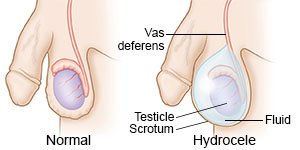Hydrocele
Medically reviewed by Drugs.com. Last updated on Aug 4, 2025.
What is a hydrocele?
A hydrocele is a collection of fluid inside the scrotum. The scrotum holds the testicles. Hydroceles can occur in one or both sides of the scrotum and usually grow slowly.
 |
What causes a hydrocele?
The cause of a hydrocele is not always known. A hydrocele may be caused by a medical condition, infection, or injury to the scrotum.
What are the signs and symptoms of a hydrocele?
A painless, swollen scrotum is the most common sign of a hydrocele. Your scrotum may feel sore and heavy from the swelling.
How is a hydrocele diagnosed?
Your healthcare provider will ask about your symptoms and examine you. Tell your provider about any injury to your scrotum. Your provider will apply gentle pressure to your scrotum to check if the hydrocele gets smaller. These or other tests may also be needed:
- Transillumination is when your healthcare provider shines a bright light on your scrotum. This helps the provider see the fluid inside your scrotum. Transillumination can help identify other problems, such as a hernia.
- An ultrasound uses sound waves to show pictures of your scrotum on a monitor. An ultrasound can help show the hydrocele and any other problems in your scrotum.
How is a hydrocele treated?
Hydroceles usually go away without treatment. The hydrocele will need to be removed if it does not go away or gets very large.
- Surgery may be needed to remove the hydrocele. Surgery may also be needed if you have a hernia.
- Needle aspiration is when healthcare providers put a needle through your scrotum and into your hydrocele. The fluid is drained from your scrotum through the needle.
When should I seek immediate care?
- You have severe pain and swelling in your scrotum.
When should I call my doctor?
- Your hydrocele gets bigger or does not go away.
- You have questions or concerns about your condition or care.
Care Agreement
You have the right to help plan your care. Learn about your health condition and how it may be treated. Discuss treatment options with your healthcare providers to decide what care you want to receive. You always have the right to refuse treatment. The above information is an educational aid only. It is not intended as medical advice for individual conditions or treatments. Talk to your doctor, nurse or pharmacist before following any medical regimen to see if it is safe and effective for you.© Copyright Merative 2025 Information is for End User's use only and may not be sold, redistributed or otherwise used for commercial purposes.
Learn more about Hydrocele
Treatment options
Further information
Always consult your healthcare provider to ensure the information displayed on this page applies to your personal circumstances.
